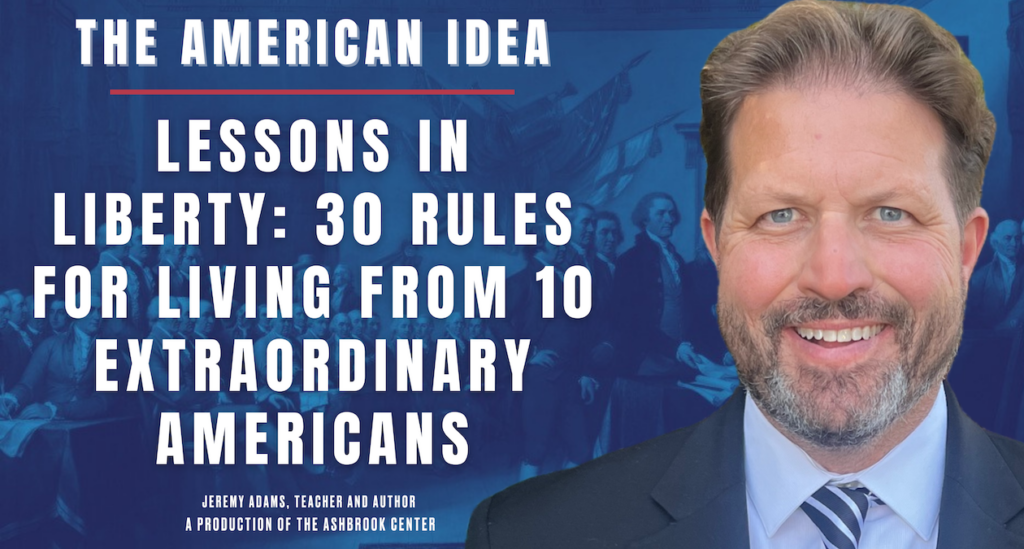Rediscovering America's Moral Compass: Jeremy S. Adams on Lessons in Liberty
April 2, 2025

Listen and subscribe to the podcast
Join The American Idea’s Listener Email list – get news about upcoming episodes and a chance to offer questions for them, too!
In an era where historical figures are often reduced to simplified narratives and American identity faces intense scrutiny, educator and author Jeremy S. Adams presents a thoughtful perspective on the continued relevance of America’s notable citizens. His recent work, Lessons in Liberty: 30 Rules for Living from 10 Extraordinary Americans, functions as both historical exploration and practical guide for navigating today’s challenges. Adams offers insights on education, writing, and the importance of historical role models in shaping American civic life.
The Teacher’s Vantage Point
Adams brings a distinctive perspective shaped by twenty-seven years teaching in an urban high school. This extensive classroom experience has positioned him as an attentive observer of social shifts, particularly among younger generations. His transition from educator to author represents a natural extension of his commitment to ideas and American values. The classroom serves as both inspiration and testing ground, where Adams has witnessed firsthand the evolving relationship between young Americans and their national heritage.
“I’ve strived to maintain a strong Christian faith while teaching at an urban high school for nearly three decades,” Adams reflects. This balance between personal conviction and professional responsibility has informed his understanding of freedom’s complex nature. His writing emerges directly from these observations, addressing concerning trends among today’s youth, particularly regarding their relationship with social media and understanding of liberty’s responsibilities.
The Paradox of Freedom
A central theme running through Adams’ work explores the tension between personal liberty and community responsibility. He appreciates the unprecedented freedoms of our time while emphasizing that freedom is “not merely a gift but also a responsibility.” This theme connects his profiles of historical figures who, despite their diverse backgrounds and eras, shared an ability to navigate this fundamental tension.
“Previous generations of Americans have fought to secure and expand these freedoms,” Adams notes, pointing to figures like George Washington, whose decision to relinquish power after both the Revolutionary War and his presidency demonstrated a commitment to the common good over personal ambition. In contrast to many contemporary politicians, Washington’s legacy highlights the value of integrity and sacrifice in public service.
This perspective crosses political divides, inviting readers to appreciate the human complexities of historical figures often reduced to political symbols. By focusing on their humanity, quirks, and varied interests—from Jefferson’s intellectual curiosity to Ashe’s advocacy—Adams encourages a broader appreciation of their contributions beyond narrow political interpretations.
Historical Wisdom for Modern Challenges
A compelling aspect of Adams’ approach is his insistence on the continued relevance of historical figures in addressing contemporary issues. Rather than dismissing these figures for their flaws, he advocates for a nuanced engagement with their lives and principles. Each chapter in Lessons in Liberty distills three practical life lessons from these historical figures, offering wisdom that transcends their particular era.
Washington emerges as a particularly significant figure in Adams’ framework. Despite modern skepticism, Adams makes a persuasive case for Washington’s lasting significance as a model of leadership rooted in virtue. His collaboration with Madison during the Constitutional Convention demonstrated his crucial role in forging a unified nation, while his cultural resonance continues through modern portrayals like the Hamilton musical.
The selection of diverse figures in Adams’ work provides inspiring insights applicable across different backgrounds and circumstances. “Each person, from Arthur Ashe to Thomas Jefferson, revealed unexpected depths and challenges that shaped their contributions to society,” he explains. These revelations enrich the narrative, offering readers a more complete understanding beyond public personas.
In a time marked by historical amnesia and declining civic education, Adams’ work serves as a timely reminder of the wisdom embedded in America’s past. He urges readers not to take America’s freedoms for granted, warning against complacency and stressing the fragility of these liberties, which require active participation and understanding from every citizen.
Adams emphasizes that Lessons in Liberty ultimately invites readers not to blindly venerate historical figures, but to engage thoughtfully with their complexity and extract lasting lessons for modern life. His work represents not merely a historical study but a practical philosophy for renewing the American experiment in each generation. It stands as a compelling argument that amid unprecedented challenges, Americans might find valuable guidance by rediscovering the moral and civic wisdom of those remarkable citizens who came before.

